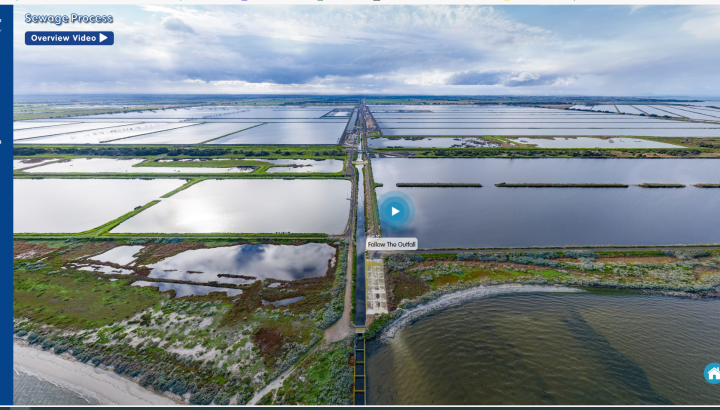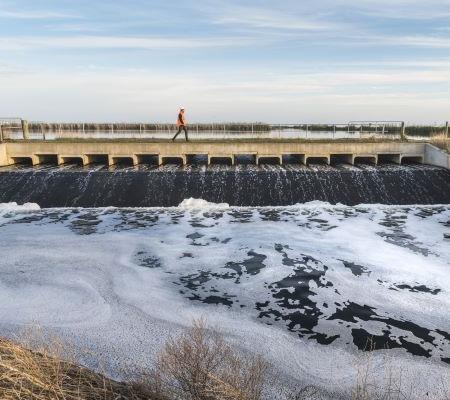 Return to search results
Return to search results
Virtual Tour: The Western Treatment Plant
Go behind the scenes at the Western Treatment Plant. Learn about the key processes of the natural and urban water cycle, water management and how sewage becomes a valuable and reusable resource. Discover how to manage water sustainably.
| Group size | 10 – 70 participants per booking |
| Pricing | on application |
| Duration | 60 - 90 minutes |
Get in touch to make a booking
Tours and learning experiences
Participants will be able to ask questions, interact with our educators and learn about the key stages of the sewage treatment process, the world-renowned wetlands and the biodiversity and heritage values of the site.
- Year 3&4: Natural and urban water cycle
-
Description
Find out about the key processes of the natural and urban water cycle when virtually exploring the Western Treatment Plant.
Learning outcomes
- Explain how water can be a liquid, solid or gas using the natural water cycle
- Identify where tap water comes from and know what happens when it goes down the drain
- Understand the different uses of water and that wastewater can be recycled
- Identify the importance of water to sustaining the lives of people
Student activities
- Explore the sewage treatment virtually
- See the process of sewage treatment
- Discuss how they are part of the water cycle
Victorian Curriculum v2.0
Science: VC2S4U04, VC2S4U07, VC2S4U08
Geography: VC2HG4K01, VC2HG4K03, VC2HG4K09
- Year 7&8: Water in World
-
Description
Learn about water security and management when virtually exploring the Western Treatment Plant. Discover how sewage becomes a valuable and reusable resource.
Learning outcomes
- Describe how water is a renewable natural resource that is finite
- Explain how people make use of water and altered the natural water cycle
- Explain the different methods to overcoming water scarcity, by reducing demand and increasing the supply of water
- Know that the liveability of Melbourne depends on a safe and secure supply of water and treatment of wastewater
- Understand that Melbourne's water resources will be impacted by climate change
Student activities
- Explore the sewage treatment virtually
- See the process of sewage treatment, from when sewage enters the plant to its treatment and reuse or release
- Discuss how they are part of the natural and urban water cycle
Victorian Curriculum v2.0
Geography: VC2HG8K01, VC2HG8K03, VC2HG8K04, VC2HG8K06
Science: VC2S8U09
- VCE: Biodiversity and Management
-
Description
Explore the Western Treatment Plant and Ramsar listed wetlands virtually. Learn about water management and how sewage becomes a reusable resource.
Learning outcomes
- Describe how demand for water is increasing pressure on this natural resource and that the supply of useable water is influenced by both seasonal and long-term climatic variations
- Explain why water is a scarce resource and identify different water management & technological options to ensure water security
- Explain how water conservation and water engineering activities can lead to more sustainable outcomes
Student activities
- Explore the sewage treatment virtually
- See the process of sewage treatment, from when sewage enters the plant to its treatment and reuse or release
- Learn about the Ramsar listed wetlands and the flora and fauna of the site
VCE Subjects
- Environment Science
- Outdoor and Environmental Studies
- Systems Engineering
- Geography
Prepare for your virtual tour
Before your session, read the following information.
- Student supervision and discipline are the school’s responsibility, and teachers accompanying school groups should actively supervise students.
- We reserve the right to cancel a booked tour and ask individuals or groups to leave the virtual tour immediately if any action or behaviour is unsafe.
- We are committed to the safety and wellbeing of children and young people, and providing a child-safe environment in line with our Child safe standards policy. All our Education Officers and Water Literacy Officers have the relevant legal requirements (Working With Children Check or Victorian Institute of Teaching registration).






